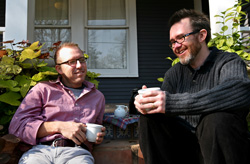![]() Rod, thanks for your last post; actually I agree with you: our government does legislate morality. In fact, that’s why I think that it’s imperative that we seriously consider the moral implications of denying same sex couples the right to marry. In doing so, we are missing an opportunity to decrease STDs, HIV, and promiscuity in general, not to mention stabilizing the home life of the many same sex couples who are already adopting and birthing children. So, I guess I’m arguing that it’s immoral to do nothing to encourage monogamy among same sex couples.
Rod, thanks for your last post; actually I agree with you: our government does legislate morality. In fact, that’s why I think that it’s imperative that we seriously consider the moral implications of denying same sex couples the right to marry. In doing so, we are missing an opportunity to decrease STDs, HIV, and promiscuity in general, not to mention stabilizing the home life of the many same sex couples who are already adopting and birthing children. So, I guess I’m arguing that it’s immoral to do nothing to encourage monogamy among same sex couples.
But today I’d like to dig a little deeper into what separates our perspectives.
Many of my commenters have expressed frustration over my initial post in which I narrated my story on this issue. It seems that for many of our readers, my own experience of life and my friendship with and compassion for gay and lesbian persons should play no role in the formation of my opinion regarding their rights. Many of these commenters, for instance, feel that posting a Bible verse, or telling me that God never changes is sufficient to show how faulty is my thinking. (If it’s okay with you, Rod, I’d like to finish up with government action this week, get into issues philosophical next week, and then tackle the theological/biblical messages after that. (Not to tip my hand, but I will be asking why they are so impressed with Leviticus 18:22 but not 19:27 or 20:9, 10, and 18!))
Back to our different starting points regarding how experience bears on the same sex marriage debate. I watched an interesting TED talk today in which Jonathan Haidt addressed the real difference between liberals and conservatives. His thesis is that liberals are open to letting their experiences affect their reasoning, while conservatives are not. That made me think not only of my earlier post, but of your response to that post in which you wrote of your own journey regarding same sex relations, and you wrote an honest line that jumped out at me: “I am temperamentally inclined to be conservative, and suspicious of innovation.”
I’ve heard other conservatives tell me, “I’d like to be pro-gay rights or pro-gay marriage — in fact it would be easier — but I just can’t because of _________.” (Maybe the Bible or natural law or some other firmly held conviction.) What’s interesting to me is that when I repeat a line like that to persons more liberal on this issue — as I did tonight at dinner to a straight woman and a gay man — they almost shout back at me, “Well if they want to be for it, then they should be for it!!!”
I’m not writing any of this to place one of our views above the other, but simply to get your opinion on Haidt’s thesis. Do you think this is a valid way to differentiate conservative reasoning from liberal reasoning?
And I in no way want to dismiss history and tradition — in fact, I’ve written several books on ancient Christian practices and, like you, pray the Jesus Prayer on a daily basis. I’m just looking for a way of reasoning that is faithful to the past but also receptive to experience. I’m admitting, as I did in that earlier post, that my personal interactions with gay and lesbian persons has influenced my opinion, though I don’t think it has clouded my judgment.
Further, I read Ross Douthat’s essay at the end of your post, and I know what he’s saying. In fact, his critique of liberalism is one of the reasons that I don’t apply that label to myself. But I do wonder if there’s a way to progress in the granting of individual rights but still have those rights chastened by Christian faith. Then we would not think that we “shall be as gods,” but we might in fact do a little something that aims us in God’s direction. Am I utopian to believe that reason and experience — rooted in scripture and tradition, with faith in the guidance of the Holy Spirit — might act as our guides in these matters?
In the end, I guess I agree with Andrew Sullivan in his response to your Culture 11 piece: The dream of modernity has died, and we need to be realistic and pragmatic as we plow into the future. I guess I just find it strange that Douthat refers to liberals as utopians when I often find conservatives to be the uptopians — it’s just that conservatives are longing for a utopia of the past.

